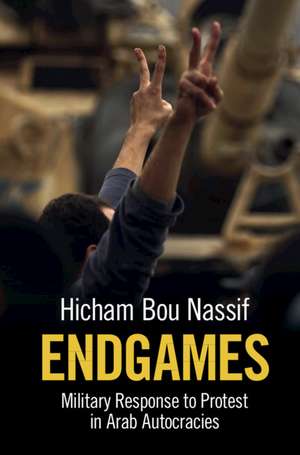Endgames: Military Response to Protest in Arab Autocracies
Autor Hicham Bou Nassifen Limba Engleză Hardback – 30 sep 2020
| Toate formatele și edițiile | Preț | Express |
|---|---|---|
| Paperback (1) | 281.17 lei 6-8 săpt. | |
| Cambridge University Press – 30 sep 2020 | 281.17 lei 6-8 săpt. | |
| Hardback (1) | 687.99 lei 6-8 săpt. | |
| Cambridge University Press – 30 sep 2020 | 687.99 lei 6-8 săpt. |
Preț: 687.99 lei
Preț vechi: 799.98 lei
-14% Nou
Puncte Express: 1032
Preț estimativ în valută:
131.71€ • 135.45$ • 109.26£
131.71€ • 135.45$ • 109.26£
Carte tipărită la comandă
Livrare economică 15 februarie-01 martie
Preluare comenzi: 021 569.72.76
Specificații
ISBN-13: 9781108841245
ISBN-10: 1108841244
Pagini: 300
Dimensiuni: 230 x 160 x 15 mm
Greutate: 0.58 kg
Editura: Cambridge University Press
Colecția Cambridge University Press
Locul publicării:Cambridge, United Kingdom
ISBN-10: 1108841244
Pagini: 300
Dimensiuni: 230 x 160 x 15 mm
Greutate: 0.58 kg
Editura: Cambridge University Press
Colecția Cambridge University Press
Locul publicării:Cambridge, United Kingdom
Cuprins
Introduction; 1. Coups, coup-proofing, and military politics in endgames; 2. Coups, coup-proofing, and regime formation in Egypt and Syria; 3. Coups, coup-proofing, and the neoliberal age in Egypt and Syria; 4. How coup-proofing structured military response to protest in Egypt and Syria; 5. How coup-proofing structured military response to protest in Tunisia and Libya.
Recenzii
'Endgames is a brilliantly informative and compelling comparative study of the troubling role of Arab armies in politics. With profound historical depth spanning more than a century, Bou Nassif skilfully deciphers why and how Arab armies deal with popular dissent and helps both scholars and activists understand officers' political behavior.' Zeinab Abul-Magd, Oberlin College
'Bou Nassif has written what is sure to be one of the defining books on the Arab uprisings of 2011. Synthesizing vast amounts of historical detail, he details how the coup-prevention tactics employed by the region's autocrats shaped military responses to protests in Tunisia, Egypt, Syria and Libya. If you want to understand what happened in the Arab Spring, this is essential reading.' Risa Brooks, Marquette University
'A refreshing take on military reactions to nonviolent mass protest in the Arab world. Drawing on a historical-institutionalist perspective, the empirically rich case studies generate new insights into the complicated interaction between autocratic leaders, military elites and protest movements during episodes of civic resistance. At a moment when democracy is in decline worldwide and elected civilian leaders in the West threaten peaceful protesters with military force, the understanding of military decisions about whether to support or withhold support from political leaders gains a new significance.' Aurel Croissant, Heidelberg University
'Bou Nassif has written what is sure to be one of the defining books on the Arab uprisings of 2011. Synthesizing vast amounts of historical detail, he details how the coup-prevention tactics employed by the region's autocrats shaped military responses to protests in Tunisia, Egypt, Syria and Libya. If you want to understand what happened in the Arab Spring, this is essential reading.' Risa Brooks, Marquette University
'A refreshing take on military reactions to nonviolent mass protest in the Arab world. Drawing on a historical-institutionalist perspective, the empirically rich case studies generate new insights into the complicated interaction between autocratic leaders, military elites and protest movements during episodes of civic resistance. At a moment when democracy is in decline worldwide and elected civilian leaders in the West threaten peaceful protesters with military force, the understanding of military decisions about whether to support or withhold support from political leaders gains a new significance.' Aurel Croissant, Heidelberg University
Notă biografică
Descriere
Explores the different military responses to popular uprisings during the 2011 Arab Spring in Egypt, Syria, Tunisia, and Libya.
